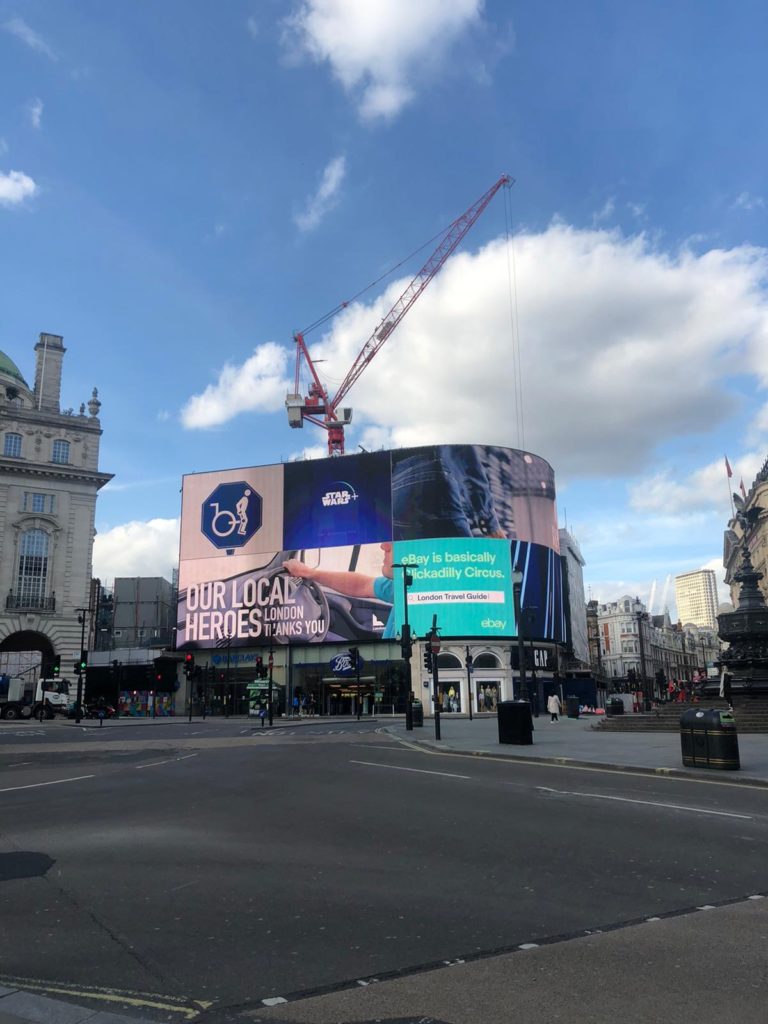This blog is now also available as a once-a-day email. If you think this might work better for you why not subscribe here? (It’s free and there’s a 1-click unsubscribe if you subsequently decide you need to prune your inbox!) One email a day, in your inbox at 07:00 every morning.
London under lockdown
Piccadilly Circus, London, 5pm today
There’s no going back to ‘normal’
My day started by listening to the New York Times’s ‘The Daily’ podcast, which today consisted of an interview with Dr Anthony Fauci, a leading medical scientist who has been head of the US National Institute of Allergy and Infectious Diseases at the National Institutes of Health since 1984. Yes, that’s right: since 1984: that means he’s served under six presidents — Ronald Reagan, George Bush Snr, Bill Clinton, George W Bush, Barack Obama and the current clown.
He also seems to be the only real grown-up in the White House as the Trump crowd try to come to terms with the Coronavirus pandemic. Fauci often stands behind Trump as he conducts his political rallies that are masquerading as press conferences. Once, when Trump said something unusually stupid, the doctor was seen to put his hand to his forehead. He may have been brushing away a fly or wiping a bead of perspiration, but the Fox News fanatics interpreted it as a gesture of contempt for their beloved leader, since when Fauci has been since subjected to such a torrent of online threats and abuse that the Secret Service has had to increase his security cover.
His conversation with the podcast host, Michael Barbarro, was fascinating from beginning to end, but one bit in particular stood out.
The point of this is that when the current crisis is over we’ll be returning to a changed world — not just because the virus will still be hanging around, but there there are others like it waiting in the wings.
This crisis, says the political philosopher John Gray in a in a New Statesman essay published this week, “is a turning point in history”. The era of peak globalisation is over, he continues.
“An economic system that relied on worldwide production and long supply chains is morphing into one that will be less interconnected. A way of life driven by unceasing mobility is shuddering to a stop. Our lives are going to be more physically constrained and more virtual than they were. A more fragmented world is coming into being that in some ways may be more resilient. “
Human beings are a resilient species. We wouldn’t be here if we weren’t. But the post-war era has conditioned us to think that we know what normality should look like. It’s what Gray describes as “an embellished version of the recent past”. The problem with our recent past is that it was ecologically unsustainable, riven by inequality and dependent on complex systems of unbelievable fragility — as the Coronavirus has brutally revealed. And if we go back to that then we won’t deserve to survive.
A situation in which so many of the world’s essential medical supplies originate in China – or any other single country – will not be tolerated, says Gray.
Production in these and other sensitive areas will be re-shored as a matter of national security. The notion that a country such as Britain could phase out farming and depend on imports for food will be dismissed as the nonsense it always has been. The airline industry will shrink as people travel less. Harder borders are going to be an enduring feature of the global landscape.
Next time we go to France, I was thinking as I read that, we may have to produce a certificate testifying either that we have acquired immunity to COVID-19 or have been vaccinated. In other words, it will be like what travelling with a dog used to be like — all that stuff about rabies and so on. And so on.
To a virus, the world may be borderless. But for humans borders will become even more formidable. Worst-case scenarios for the United States include individual states barring intra-state traffic. Likewise within the European Union’s Schengen area, where frontiers were once a thing of the past but could conceivably become a thing of the future.
In “The World after Coronavirus”, a long essay recently published in the Financial Times, the Israeli historian Yuval Noah Harari says that we now face two epochal choices: the first is between totalitarian surveillance and citizen empowerment. The second is between nationalist isolation and global solidarity. As far as the second of these is concerned, I think that the die is already cast. Globalisation as we have known it will go into reverse. The post-war international order created under American hegemony is coming apart. It was creaking at the seams anyway, but the election of Donald Trump really put the skids under it. Under the pressure of the virus, it’s not just America First. It’s also becoming Britain First, Italy First. France First. And of course Hungary First.
As for the first epochal choice that Harari thinks we face — between totalitarian surveillance and citizen empowerment, well we’re part-way down the first track already. Controlling the pandemic depends on identifying who has it, tracking their movements and contacts, and isolating or treating them — if need be forcibly. This is immensely labour-intensive. But digital technology and the smartphone has provided the perfect tool for the job, and the Oriental countries which have done best in controlling COVID-19 have made good use of it.
The lesson has not been lost on the West. And although the privacy and other risks implicit in the tech are terrifying, the pressure to deploy the tools may become irresistible. As Harari says, it is in the nature of emergencies that they “fast-forward historical processes.
“Decisions that in normal times could take years of deliberation are passed in a matter of hours. Immature and even dangerous technologies are pressed into service because the risks of doing nothing are bigger. Entire countries serve as guinea-pigs in large-scale social experiments.”
The risk and dangers of a massive increase in surveillance justified by this emergency are real. But many of them stem from the fact that, under current models, all of the hoovered data is held centrally. But it doesn’t have to be done that way.
There’s an interesting experiment called Private Kit: Safe Paths under way at MIT, for example. Participants install an app which enables them accurately to log their own location on their own phones. (So it never gets uploaded to the cloud). Those who have been diagnosed as infected can, if they wish, share an accurate location trail with health officials once they are diagnosed positive, replacing a process that has historically been conducted only through memory. The app uses proximity-detection technology to tell a phone’s owner whether they have crossed paths with a diagnosed carrier. The researchers describe it as “a free, open-source and privacy-first contact-tracing technology that provides individual users with information on their interaction with diagnosed COVID-19 carriers, while also empowering governments’ efforts to contain an epidemic outbreak”.
It could be an interesting way of avoiding the choice that Harari says we will have to make as a result of this crisis– balancing necessary surveillance with human empowerment — by having both. Stay tuned.
Jack Schofield RIP
Photo by Sarah Lee/ The Guardian
This really marks the end of an era. Jack Schofield was taken to hospital following a heart attack on Friday night and died on Tuesday afternoon. He was the Guardian’s former computer editor and author of its technology advice column, Ask Jack, for almost 20 years. He was 72 and had written for the paper since 1983, initially as a columnist for the new computing pages, called Futures Micro Guardian. His first column, on how to buy a home “micro”, walked the reader through the difficult process of picking one of the many microcomputers available in Britain at the time, ultimately recommending the £400 Acorn BBC Model B or, for the budget conscious, the £100 Sinclair Spectrum. It’s still online and if you go to it you will be transported back to a different world.
My abiding memories of him are of a warm, generous spirit with masses of common sense — a rare quality at the dawn of the personal computer age. And he never succumbed to the Silicon Valley Reality Distortion Field. May he rest in peace.


